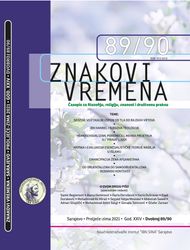Sedžda: vertikalni uspon od tla do rajskih vrtova
Sujud (Sajdah): Vertical Ascent from the Ground to the Gardens of Paradise
Author(s): Esad DurakovićSubject(s): Contemporary Islamic Thought, Qur’anic studies
Published by: Naučnoistraživački institut »Ibn Sina«
Keywords: Sujud; Sajdah; Islam; prostration; God’s Grace; gardens of paradise;
Summary/Abstract: Islam is a religion that constantly insists on building positivity. It succeeds in this especially in the act of prostration as an exceptional expression of contrition with which man ascends to the grace of God. Symbolically, man in prostration falls with his forehead to the ground, “referring” to the religious fact that man was created from earthly dust, which symbolizes nothingness. However, in this act, as an expression of piety, man achieves a spiritual ascent which can be figuratively said to be a vertical ascent to God’s Grace and gardens of paradise full - again metaphorically - of rivers and green gardens that are in dynamic binary opposition to earthly dust. Positivity is complete. The creation of man from earthly dust can be understood, therefore, as a brilliant religious or theological argument, it can also be a powerful poetic inspiration, as well as an astonishing, optimally successful semiotic stylem. In creating positivity, it is perfectly congruent with the phrase in al-Fatihah: “Guide us to the Upraight Path.”
Journal: Znakovi vremena - Časopis za filozofiju, religiju, znanost i društvenu praksu
- Issue Year: XXIV/2021
- Issue No: 89/90
- Page Range: 11-18
- Page Count: 8
- Language: Bosnian

